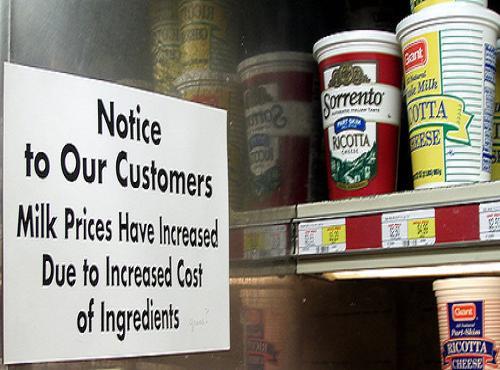
Photo credits : billadler
There is always a direct relation between prices of certain commodities and inflation. Let’s take the price of oil. This and inflation are connected in a cause and effect relationship. As oil prices move up or down, inflation follows in the same direction. The reason why this happens is that oil is a major input in the economy – it is used in critical activities such as fueling transportation – and if input costs rise, so does the cost of end products. For example, if the price of oil rises, then it costs more to make plastic, and a plastics company then passes on some or all of this cost to the consumer, which raises prices and thus – inflation.
To understand inflation, we must first understand what the word means.
Inflation is an increase in the price of a basket of goods and services that represents the economy as a whole. It is an upward movement in the average level of prices, measured as an annual percentage increase. As inflation rises, every rupee you own buys a smaller percentage of a good or service.
The value of a rupee does not stay constant when there is inflation. This value is seen by looking at its purchasing power, i.e. the real, substantial goods that money can buy. Because inflation is a rise in the general level of prices, it is intrinsically linked to money, as captured by the often heard refrain “Inflation is too many dollars chasing too few goods”.
This is not difficult to follow. Imagine a world with two commodities: Mangoes picked from mango trees, and paper money printed by the government. In a year where there is a drought and mangoes are scarce, the price of mangoes rise, as there is substantially more money chasing very few mangoes.
Now if demand for goods and services doesn’t fall as much, then price of goods and services go up. Hence the retail price index goes up, and inflation takes place.
Inflation does NOT however mean an increase in the general price level of goods and services within a country. What inflation actually means is an inflation of the money supply, i.e. an increase in the total number of rupees in circulation. An increase in the price level is a normal consequence of inflation because it depreciates the currency, lowering each rupee’s purchasing power.
Prices and inflation
There is always a direct relation between prices of certain commodities and inflation. Let’s take the price of oil. This and inflation are connected in a cause and effect relationship. As oil prices move up or down, inflation follows in the same direction. The reason why this happens is that oil is a major input in the economy – it is used in critical activities such as fueling transportation – and if input costs rise, so does the cost of end products. For example, if the price of oil rises, then it costs more to make plastic, and a plastics company then passes on some or all of this cost to the consumer, which raises prices and thus – inflation.
However, even when inflation comes down, prices in the market do not come down immediately. The reasons may be many. Inflation comes down due to
- fall in consumption,
- low industrial output,
- fall in industrial commodity prices, especially crude, steel, etc., and
- industrial slowdowns.
Market prices for ordinary citizen are not like that. When supply is more than demand, industries slow down the output and the prices go up. When inflation is down RBI reduces the interest rate, prime lending rate, etc., which increases liquidity in the economy. Excess money is then often used for speculation with traders cornering the stock and creating artificial scarcity, thereby increasing the prices or not letting it come down.
In conclusion, inflation will always be with us; it’s an economic fact of life. It is not intrinsically good or bad, but it certainly does impact our lives. Everyone knows, once the prices go up they stay up and never come down. Negative inflation has no meaning to common man if it does not translate into reasonable living standards.
charming post. simply one decimal where I bicker with it. I am emailing you in detail.
they will self behave provided human greed is not permitted to interfere
Gud One..!
That is why insurance of 5 lakhs pays u 15 lakhs after 15 yrs…